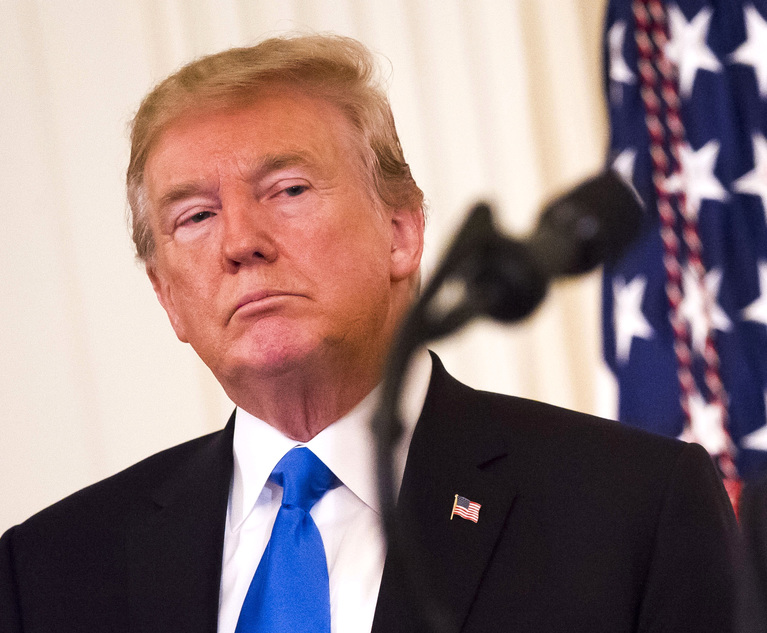 Former President Donald Trump. Photo: Diego M. Radzinschi/ALM
Former President Donald Trump. Photo: Diego M. Radzinschi/ALMAmerica Voted. What's Next For Big Law?
It's difficult to predict what will happen once Donald Trump is sworn in as President of the United States but it's fairly certain that whatever he does, Big Law will be busy, the Global Lawyer writes.
November 10, 2024 at 10:50 PM
5 minute read
The world had no say in the outcome of the U.S. Presidential election last week. But it has to live with it.
There’s been no shortage of post-mortems since Donald Trump was elected to a second term as President of the United States following a tumultuous election, with pundits still parsing the results and pronouncing what they say about America.
But what do they mean for the rest of the world? And what about the legal world?
“Unpredictable” is the overarching conclusion. There is widespread agreement that Trump is both mercurial and transactional. So how much of his campaign rhetoric will translate into policy remains to be seen.
In the meantime, this is what we know: Lawyers will be busy.
Big Law dealmakers expect that this very “pro-business” President will reduce regulations and domestic oversight, lower corporate tax rates, and ease administrative burdens. This, says Paul, Weiss, Rifkind, Wharton & Garrison chair Brad Karp, will fuel M&A activity and spur U.S. capital markets. Cross-border private equity deals also are likely to continue, lawyers say. At least that's the short-term scenario.
In the longer term, however, the international picture is a lot less clear. Trump, an isolationist-leaning leader who has espoused an “America First” policy, has promised to impose a “universal tariff” of at least 10% on all U.S. imports, and tariffs of 60% or more on products coming to the U.S. from China. For Trump, tariffs are the cure-all to what he sees as America’s decline, believing they will reverse decades of globalization, force factories to move back to the United States and reinvigorate manufacturing.
Both America’s allies and its rivals started preparing for this possibility months before the election. Knowing from his first term that Trump responds to fawning and flattery, many have already tried to ingratiate themselves with the incoming President, hoping he will use his tariff threats more as a negotiating tool than a blanket, across-the-board protectionist move. Lawyers say their clients are already seeking legal advice on how they might qualify for exceptions and carve-outs if tariffs are imposed.
But no one is taking chances.
The European Union has discussed how it might retaliate with tariffs of its own (it reportedly has compiled a list of American goods it could slap with reciprocal tariffs) and lawyers say it may adopt a stronger industrial policy to support European “champions” in such sectors as defense and energy, enabling it to effectively compete internationally.
Lawyers say top Europe-based law firms that with strong M&A practices would likely benefit from such a move. But they're not alone. European antitrust lawyers also would see an uptick in work if the EU, arguably the world’s toughest antitrust enforcer, decides to step up its already tough enforcement if it sees a Trump administration taking a less aggressive antitrust stance in mergers and acquisitions and in enforcement against U.S. companies doing business globally.
With all these shifts in U.S. trade and competition policy, clients are facing a period of uncertainty, Sidley Austin’s Brussels managing partner, Ken Daly, told EU reporter Linda Thompson last week. “We are expecting to be very busy,” he said.
There are plenty of other potential policy changes likely to impact lawyers and their clients. For example, what will become of the USMCA, the trade agreement between the U.S., Mexico and Canada, given that so many companies have shifted manufacturing from China to Mexico? Also, will Trump, who would rather focus on the United States, choose to ignore South America and Africa, even though China has been investing in their mining operations, which produce lithium and other valuable minerals? And how will the expected changes in U.S. energy policy affect companies in the Middle East?
China, the world’s second-largest economy, is, of course, Trump’s main target. It was Trump, after all, who started the trade war with China during his first term, and the rivalry between the two nations has only intensified since. But China, like Europe, is ready. It has built up its technology sector, putting a special focus on highly valuable semiconductors and chips. It reportedly has its own list of possible retaliatory tariffs, which would hurt US. business. It has invested heavily in Southeast Asia, Africa and Latin America. It has improved relations with Japan, South Korea and Australia, all countries that could be hit hard by blanket U.S. tariffs. And it has flexed its muscle in the South China Sea, reminding the world that its military is strong—and Taiwan is on the table.
In other words, the world is preparing for multiple trade wars. And law firms’ international trade practices are likely to see demand for their services spike as clients look to “Trump-proof” their businesses.
But history has shown that trade wars don’t usually end well. Economists say broad-based tariffs increase prices for manufacturers and businesses that have to buy parts from abroad, and those higher prices are then passed on to consumers. And when countries retaliate, global supply chains are disrupted and long-standing alliances risk disappearing.
And while not directly related to the legal industry, there is a fear that Trump’s known admiration for leaders like Vladimir Putin, Viktor Orban, Benjamin Netanyahu and even Xi Jinping, could lead to more global chaos, whether in Ukraine, Gaza and the occupied West Bank, Taiwan, or elsewhere in the world. Investors don't like instability and uncertainty. All this turmoil could eventually reduce global M&A activity—the bread and butter of Big Law.
The world's elite law firms, as strong and influential as they may be, cannot control what happens now. What they can do is manage risk, both for their clients—the businesses that keep global economies running—and for themselves.
It’s going to be a wild and exhausting four years.
NOT FOR REPRINT
© 2025 ALM Global, LLC, All Rights Reserved. Request academic re-use from www.copyright.com. All other uses, submit a request to [email protected]. For more information visit Asset & Logo Licensing.
You Might Like
View All
ALN Expands into Ghana, Tapping Into Booming Gold Market and West African Growth
3 minute read
Jones Day Names New Practice Leaders in Brussels, Latin America and the US

Lawyers React To India’s 2025 Budget, Welcome Investment And Tax Reform
Trending Stories
- 1Big Law's Middle East Bet: Will It Pay Off?
- 2'Translate Across Disciplines': Paul Hastings’ New Tech Transactions Leader
- 3Milbank’s Revenue and Profits Surge Following Demand Increases Across the Board
- 4Fourth Quarter Growth in Demand and Worked Rates Coincided with Countercyclical Dip, New Report Indicates
- 5Public Notices/Calendars
Who Got The Work
J. Brugh Lower of Gibbons has entered an appearance for industrial equipment supplier Devco Corporation in a pending trademark infringement lawsuit. The suit, accusing the defendant of selling knock-off Graco products, was filed Dec. 18 in New Jersey District Court by Rivkin Radler on behalf of Graco Inc. and Graco Minnesota. The case, assigned to U.S. District Judge Zahid N. Quraishi, is 3:24-cv-11294, Graco Inc. et al v. Devco Corporation.
Who Got The Work
Rebecca Maller-Stein and Kent A. Yalowitz of Arnold & Porter Kaye Scholer have entered their appearances for Hanaco Venture Capital and its executives, Lior Prosor and David Frankel, in a pending securities lawsuit. The action, filed on Dec. 24 in New York Southern District Court by Zell, Aron & Co. on behalf of Goldeneye Advisors, accuses the defendants of negligently and fraudulently managing the plaintiff's $1 million investment. The case, assigned to U.S. District Judge Vernon S. Broderick, is 1:24-cv-09918, Goldeneye Advisors, LLC v. Hanaco Venture Capital, Ltd. et al.
Who Got The Work
Attorneys from A&O Shearman has stepped in as defense counsel for Toronto-Dominion Bank and other defendants in a pending securities class action. The suit, filed Dec. 11 in New York Southern District Court by Bleichmar Fonti & Auld, accuses the defendants of concealing the bank's 'pervasive' deficiencies in regards to its compliance with the Bank Secrecy Act and the quality of its anti-money laundering controls. The case, assigned to U.S. District Judge Arun Subramanian, is 1:24-cv-09445, Gonzalez v. The Toronto-Dominion Bank et al.
Who Got The Work
Crown Castle International, a Pennsylvania company providing shared communications infrastructure, has turned to Luke D. Wolf of Gordon Rees Scully Mansukhani to fend off a pending breach-of-contract lawsuit. The court action, filed Nov. 25 in Michigan Eastern District Court by Hooper Hathaway PC on behalf of The Town Residences LLC, accuses Crown Castle of failing to transfer approximately $30,000 in utility payments from T-Mobile in breach of a roof-top lease and assignment agreement. The case, assigned to U.S. District Judge Susan K. Declercq, is 2:24-cv-13131, The Town Residences LLC v. T-Mobile US, Inc. et al.
Who Got The Work
Wilfred P. Coronato and Daniel M. Schwartz of McCarter & English have stepped in as defense counsel to Electrolux Home Products Inc. in a pending product liability lawsuit. The court action, filed Nov. 26 in New York Eastern District Court by Poulos Lopiccolo PC and Nagel Rice LLP on behalf of David Stern, alleges that the defendant's refrigerators’ drawers and shelving repeatedly break and fall apart within months after purchase. The case, assigned to U.S. District Judge Joan M. Azrack, is 2:24-cv-08204, Stern v. Electrolux Home Products, Inc.
Featured Firms
Law Offices of Gary Martin Hays & Associates, P.C.
(470) 294-1674
Law Offices of Mark E. Salomone
(857) 444-6468
Smith & Hassler
(713) 739-1250









